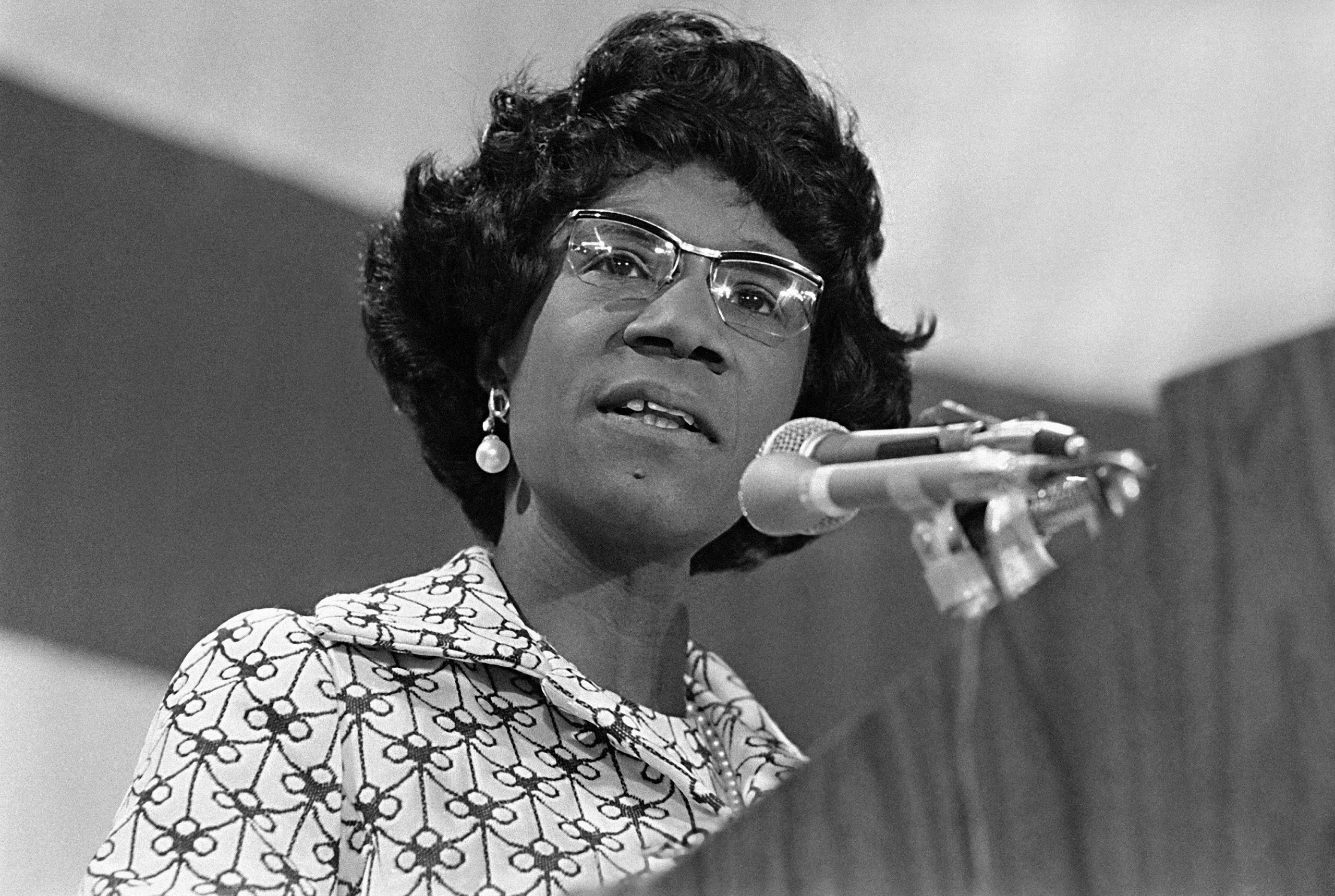Remembering Shirley Chisholm
By Admin
The tiny glittering black woman stood utterly at attention. She wore a suit of stiff brocade that fitted her shoulders so snugly it gave her a faintly military air. There was, in fact, something about her that suggested the Salvation Army. Perhaps it was only her stiff shoulders, or perhaps also her frequent references to the Lord. Then, too, she had a way of drawing herself up even straighter and stiffer in her moments of intensity, looking then totally charged with inspiration, a small quivering ramrod of righteousness.
“I’m here to tell you tonight, yes, I dare to say I’m going to run for the Presidency of the United States of America!” she uttered at the climactic center of her speech. When she said the word “dare,” she fairly squinted with indignation, and, propelled along now by her own anger, she told her audience she was out to prove to the public “that other kinds of people can steer the ship of state besides the white men …”
“Regardless of the outcome,” she continued, more slowly now for emphasis, “they will have to remember that a little 100-pound woman, Shirley Chisholm, shook things up!”
The small and hyper-tense black Congresswoman from Brooklyn was speaking to some 1300 of her supporters in a ballroom of the Americana Hotel three weeks ago. The occasion was the first fund-raising dinner for her Presidential campaign, and she had drawn to it just about everyone of importance in Brooklyn and Manhattan politics, including John Lindsay. A night of glory for her, the dinner raised some $60,000 and demonstrated her considerable drawing power in this city.
But before another week was out, her still unofficial candidacy would appear to be shaking up Shirley Chisholm every bit as much as it was shaking up the male politicians she so longed to unnerve. For she went at the end of the week to a conference of black elected officials at Washington’s Sheraton-Park Hotel, where she was made to feel only barely welcome. The few female politicians in attendance did react warmly to her, but the black male congressmen, who appeared to be calling all the shots, were almost openly contemptuous of her.
Thursday evening (November 18) a cocktail party for the visiting black politicians was held in a large room in the Rayburn building on Capitol Hill. It was a gathering of black celebrities, who, like their white counterparts at such affairs, basked in the smiles of pretty girls, looked around to see who else of importance was present, and generally gave off that ineffable air of people who have made it and know it. Success seems to break down all philosophical barriers at Washington cocktail parties, and on this evening, at least, success had gathered in the same room black men as disparately oriented as the Nixon and Kennedy officials who showed up at the first Kennedy Center party.
So Robert Lee Grant, the tall, handsome black Republican who was fired last summer from his HUD job for shooting his mouth off against Agnew, stood easily in the same room with General Chaffee James, the black Deputy Assistant Secretary of Defense whose job it is to tell the Pentagon’s version of the news to the press. General James was the kind of man who could sound respectably militant on the color question (“I think there are two blacks we can do without, that first one and that only one”) and the next moment sound like General Turgeson on the subject of his son’s 400-plus bombing missions in Vietnam. If you circulated around the room and listened to the talk, you could become quickly disillusioned about the salvific powers of black skin in America — that is, if you were white and liberal and secretly convinced that the blacks just had to be better. They had suffered too much at our hands. But there wasn’t much of the halo effect of suffering floating around that room in the Rayburn building. And there was to be a notable absence of halos among conference members during the next two days, an atmospheric condition which you had to be able to sense in order to understand what was really going on between Shirley Chisholm and what has come to be known as the black political caucus.
Omens of Mrs. Chisholm’s problems were evident at the cocktail party. When cornered and asked about her, Congressman Lewis Stokes (the brother of Carl Stokes) shrugged his shoulders, laughed, and uttered mock groans. Congressman William Clay of Missouri said, “Who’s Shirley Chisholm? You don’t represent The Village Voice, you can’t represent The Village Voice!” And he, too, laughed. Mrs. Chisholm was to be dealt with by the cruelest of all insults — she was to be ignored.
She herself soon around at the party looking as if she was having a good time. She was wearing a more functional woolen suit this time, again with the square-shoulders of a Salvation Army uniform. Women approached her in an almost endless stream, some of them just shyly shaking her hand and walking away, the bolder of them saying things like “We have admired you from afar all the time.” A vice-president of the National Council of Negro Women told me Mrs. Chisholm was extremely popular with black women. And for the next two days she did have an extraordinary way of dividing every gathering of blacks quite neatly along strict sexual lines.
Indeed if there had been a larger proportion of women among the 300-odd blacks who attended the conference that weekend. Mrs Chisholm might have gotten the the endorsement of the black political caucus. As matters stood, however, she was treated to chilly courtesies, being asked to sit on the dais at one luncheon to introduce a speaker, and being given the moderator’s seat on a panel discussion of childhood and early development.
The latter assignment royally peeved her, and she stood up in the first Friday morning session of the conference to let the assembled men know she couldn’t understand why she had been left off the important political panels when she was the only serious Presidential candidate among them.
“For over 21 years this has been a part of my life,” she said, quivering with rage. “They’re always plotting and planning for me, but Almighty God has burned me up… Shirley Chisholm is the highest elected black woman official and, for those of you who don’t know it, the Democratic National Committeewoman from the State of New York. You’d better wake up!”
Her outburst made the evening news and a New York Times headline the next day. It did little to change her status with the black male congressmen.
The conference itself produced little news, and though there were closed discussion sessions, nothing conclusive was decided beyond the vote to hold a black political convention sometime early next year. There were sessions on techniques for designing districts to preserve black Congressional seats, sessions which made the whole black caucus seem like a tardy and futile effort, for it was generally agreed that redistricting plans should be ready and presented to the courts by the end of the month, wherever legislatures were gerrymandering blacks out of their seats. (But one reporter thought even court efforts would yield small gains for blacks, the courts themselves being frequently political provinces.)



